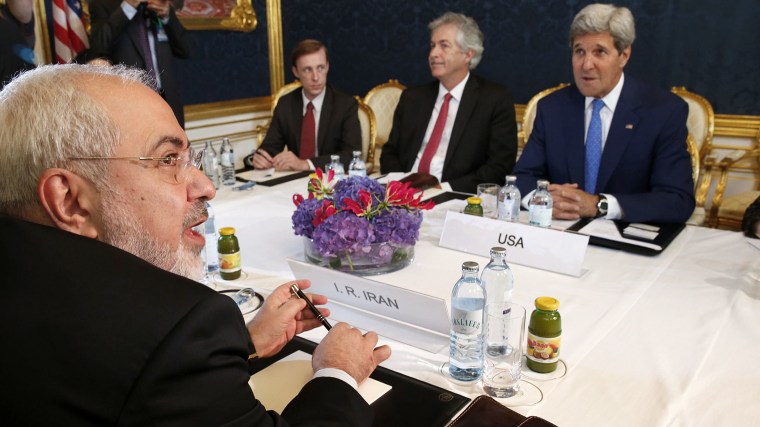As international nuclear talks continue with Iran, and a pressing deadline looms, the domestic political debate is heating up, with a variety of contingents delivering a similar message to the American public: "Don't believe those other guys; believe me."
Oddly enough, each side seems to believe it's winning the political argument. Josh Kraushaar, a National Journal conservative, continues to believe President Obama is dangerously "ignoring public opinion," willing to "bypass public resistance" to P5+1 diplomacy. As we discussed last week, prominent Republicans are pushing the same line -- Sen. Ted Cruz (R-Texas) expressed dismay that the White House is "circumventing the will of the American people," while former Gov. Jeb Bush (R) said "public opinion" is not on Obama's side.
As a matter of principle, there's room for debate about whether or not polls matter in a case like this. Sometimes worthwhile ideas are unpopular; sometimes dreadful ideas enjoy broad support. But in the case of the Iran talks, the more pressing concern is the degree to which Republican assumptions have the entire story backwards.
By a nearly 2 to 1 margin, Americans support the notion of striking a deal with Iran that restricts the nation's nuclear program in exchange for loosening sanctions, a new Washington Post-ABC News poll finds. [...] Overall, the poll finds 59 percent support an agreement in which the United States and its negotiating partners lift major economic sanctions in exchange for restrictions on Iran's nuclear program. Thirty-one percent oppose a deal. Support outpaces opposition across nearly all demographic and political groups....
The results are very similar to those from a recent CNN poll, which found a broad majority of Americans in support of the negotiations with Iran about its nuclear program.
In fairness, there's plenty of data that points to rival concerns among Americans -- most Americans, for example, don't want Iran to have nuclear weapons, and the mainstream is skeptical about the long-term efficacy of a diplomatic agreement.
And while those doubts matter, they're also distinct from the question at hand. Republicans and many of their media allies are working from the assumption that the public does not approve of the ongoing negotiations and the Obama administration's entire approach enjoys little national support.
Reality points in the exact opposite direction. Indeed, the Post-ABC survey "finds that even those with limited hopes of a fruitful agreement are open to a deal."
What's more, as we talked about last week, there’s also polling that shows the public disapproving of the 47 Senate Republicans who tried to derail the international talks and sabotage American foreign policy, and still more polling that shows Israeli Prime Minister Benjamin Netanyahu’s support among Americans dropping to new lows, even as most of Congress elevates him to Reagan-esque levels
To date, how many independent polls have shown American voters souring on the nuclear talks? So far, none.
The right and much of the media have made a series of assumptions about public attitudes. Most of those assumptions are mistaken.
